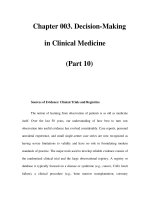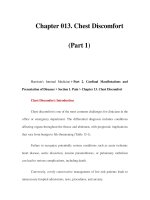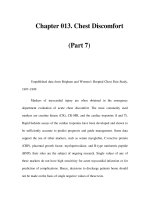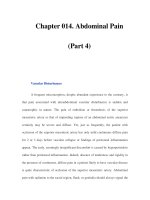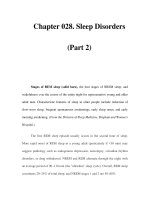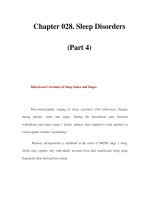Chapter 100. Megaloblastic Anemias (Part 10) pps
Bạn đang xem bản rút gọn của tài liệu. Xem và tải ngay bản đầy đủ của tài liệu tại đây (12.85 KB, 5 trang )
Chapter 100. Megaloblastic
Anemias
(Part 10)
Tropical Sprue
Nearly all patients with acute and subacute tropical sprue show
malabsorption of cobalamin; this may persist as the principal abnormality in the
chronic form of the disease, when the patient may present with megaloblastic
anemia or neuropathy due to cobalamin deficiency. Absorption of cobalamin
usually improves after antibiotic therapy and, in the early stages, folic acid
therapy.
Fish Tapeworm Infestation
The fish tapeworm (Diphyllobothrium latum) lives in the small intestine of
humans and accumulates cobalamin from food, rendering this unavailable for
absorption. Individuals acquire the worm by eating raw or partly cooked fish.
Infestation is common around the lakes of Scandinavia, Germany, Japan, North
America, and Russia. Megaloblastic anemia or cobalamin neuropathy occurs only
in those with a heavy infestation.
Gluten-Induced Enteropathy
Malabsorption of cobalamin occurs in ~30% of untreated patients
(presumably those in whom the disease extends to the ileum). Cobalamin
deficiency is not severe in these patients and is corrected with a gluten-free diet.
Severe Chronic Pancreatitis
In this condition, lack of trypsin is thought to cause dietary cobalamin
attached to gastric non-IF (R) binder to be unavailable for absorption. It has also
been proposed that in pancreatitis, the concentration of calcium ions in the ileum
falls below the level needed to maintain normal cobalamin absorption.
HIV Infection
Serum cobalamin levels tend to fall in patients with HIV infection and are
subnormal in 10–35% of those with AIDS. Malabsorption of cobalamin not
corrected by IF has been shown in some, but not all, patients with subnormal
serum cobalamin levels. Cobalamin deficiency sufficiently severe to cause
megaloblastic anemia or neuropathy is rare.
Zollinger–Ellison Syndrome
Malabsorption of cobalamin has been reported in the Zollinger–Ellison
syndrome. It is thought that there is a failure to release cobalamin from R-binding
protein due to inactivation of pancreatic trypsin by high acidity, as well as
interference with IF binding of cobalamin.
Radiotherapy
Both total-body irradiation and local radiotherapy to the ileum (e.g., as a
complication of radiotherapy for carcinoma of the cervix) may cause
malabsorption of cobalamin.
Graft-versus-Host Disease
This commonly affects the small intestine. Malabsorption of cobalamin due
to abnormal gut flora, as well as damage to ileal mucosa, is frequent.
Drugs
The drugs that have been reported to cause malabsorption of cobalamin are
listed in Table 100-4. Megaloblastic anemia due to these drugs is, however, rare.
Abnormalities of Cobalamin Metabolism
Congenital Transcobalamin II Deficiency or Abnormality
Infants with TC II deficiency usually present with megaloblastic anemia
within a few weeks of birth. Serum cobalamin and folate levels are normal, but the
anemia responds to massive (e.g., 1 mg three times weekly) injections of
cobalamin. Some cases show neurologic complications. The protein may be
present but functionally inert. Genetic abnormalities found include mutations of an
intra-exonic cryptic splice site, extensive deletion, single nucleotide deletion,
nonsense mutation, and an RNA editing defect. Malabsorption of cobalamin
occurs in all cases and serum immunoglobulins are usually reduced. Failure to
institute adequate cobalamin therapy or treatment with folic acid may lead to
neurologic damage.
Congenital Methylmalonic Acidemia and Aciduria
The infants with this abnormality are ill from birth with vomiting, failure to
thrive, severe metabolic acidosis, ketosis, and mental retardation. Anemia, if
present, is normocytic and normoblastic. The condition may be due to a functional
defect in either mitochondrial methylmalonyl CoA mutase or its cofactor
adocobalamin. Mutations in the methylmalonyl CoA mutase are not responsive, or
only poorly responsive, to treatment with cobalamin. A proportion of the infants
with failure of adocobalamin synthesis respond to cobalamin in large doses. Some
children have combined methylmalonic aciduria and homocystinuria due to
defective formation of both cobalamin coenzymes. This usually presents in the
first year of life with feeding difficulties, developmental delay, microcephaly,
seizures, hypotonia, and megaloblastic anemia.
